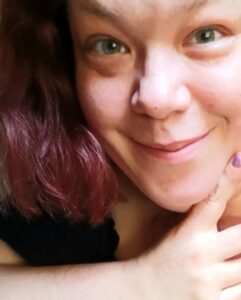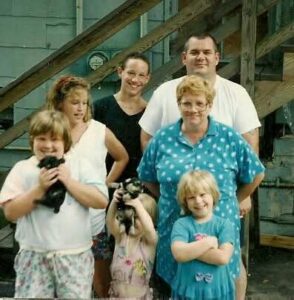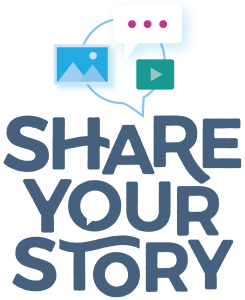Kerry
An RSV Story
Place of Residence: Saint Elmo, Illinois
Kerry was only a newborn when she contracted respiratory syncytial virus (RSV) at the hospital. Now an adult, Kerry shares her experience with RSV and how her illness impacted her family.
 How would you describe yourself? What kind of activities do you like to do?
How would you describe yourself? What kind of activities do you like to do?
I enjoy gardening, books, and outdoor activities like fishing, hiking, and camping. In my free time, I also like reading tarot/oracle cards.
I grew up with parents who were dedicated to deepening their individual religious connections. They often looked for ways to help people in need, so they founded a homeless shelter in Illinois.
How did you become sick?
When I was born in 1988, I contracted RSV at the hospital. As a newborn infant, I was vulnerable to infections like RSV, so the illness was very frightening for my parents.
How did your illness progress? At what point did your parents realize it was serious?
After the doctor diagnosed me with RSV, my heart rate became more irregular. I was diagnosed with an arrythmia caused by the RSV infection, which led to my hospitalization.
In the neonatal intensive care unit (NICU), I didn’t seem to be improving. Once the doctors determined that medical intervention wasn’t helping regulate my arrhythmia, they realized it was a serious situation. The doctor who was taking care of me even prepared my parents to let go of medical intervention.
As a newborn infant, I was vulnerable to infections like RSV, so the illness was very frightening for my parents.
 How did your illness impact your family?
How did your illness impact your family?
My father is a pastor, and he told me he nearly lost his faith then. In the hospital, he would go to the chapel and pray as he could.
I know my mom was overwhelmed, and I’ve heard stories about many of our neighbors and friends stepping in to get my mom through such a tough time. I was in the hospital for three weeks, which was emotionally tolling on both of my parents.
Are you suffering from any long-term medical complications as a result of your illness?
I suffer from a compromised immune system and reduced lung function, which I believe are a result of my RSV infection. Luckily, it hasn’t impacted my hobbies and recreational activities too much. I don’t push myself hard, but I still get out and do things when I can.
What do you want others to know about RSV? What advice would you give to someone who chose not to protect themselves or their child?
I want others to know that even if you haven’t been affected on a serious level by a vaccine-preventable disease, you can still spread illnesses to people who are more vulnerable. Some individuals, like infants, are at higher risk for diseases than others.
Additionally, it’s not always possible to know who will develop a severe case of an illness. Some bodies have to fight much harder against illnesses that could have easily been prevented, or made less severe, by vaccinations. Think long and hard about the implications of choosing not to get vaccinated—it could hurt you or your loved ones.
What have you done up to this point to raise awareness about vaccine-preventable diseases?
I make it a point to discuss vaccines with friends and family. I talk with people who have similar viewpoints to mine, as well as people who disagree. I make sure to share logic and facts because, in my opinion, misinformation is at an all-time high.
Is there anything else you want others to know about your RSV story?
Don’t put yourself or your loved ones through the agony of a vaccine-preventable disease. Because of vaccines, some diseases have been eliminated in the U.S. for decades. Vaccines have been researched and backed by science for a reason: they save lives.
BECOME A VACCINE ADVOCATE
There are lots of ways you can make a difference in your community.

 How would you describe yourself? What kind of activities do you like to do?
How would you describe yourself? What kind of activities do you like to do? How did your illness impact your family?
How did your illness impact your family?